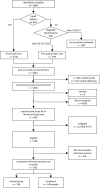The Effectiveness of Internet-Based Cognitive Behavioral Therapy for the Treatment of Depression in a Large Real-World Primary Care Practice: A Randomized Trial
- PMID: 35939620
- PMCID: PMC9683746
- DOI: 10.7812/TPP/21.183
The Effectiveness of Internet-Based Cognitive Behavioral Therapy for the Treatment of Depression in a Large Real-World Primary Care Practice: A Randomized Trial
Abstract
PurposeThe purpose of this study was to compare the effectiveness of internet-based cognitive behavioral therapy (iCBT) for depression, to that of treatment as usual (TAU) alone. MethodsIn this study, 302 depressed adult Family Medicine outpatients were randomized to receive either TAU or additional access to Thrive, a fully automated iCBT program with three video-based modules, each containing 10 lessons using behavioral activation, cognitive restructuring, and social skills training. The primary outcome was the change in the score on an online patient health questionnaire (PHQ-9), measured at 0, 8, and 24 weeks. ResultsThe intervention group saw a relative improvement of 2.5 points in PHQ-9 scores at 8 weeks (p = 0.002, d = -0.48), was 6.0 times (p < 0.001) more likely to respond (defined as a ≥ 50% reduction in PHQ-9 score), and was 5.2 times (p = 0.04) more likely to have achieved remission (defined as a PHQ-9 score of < 5) at 8 weeks, but by 24 weeks, the control group had improved to a similar extent as the intervention group (d = -0.14). The intervention group improved in productivity at 8 weeks (p = 0.03), but by 24 weeks, the TAU group had also improved to a similar extent. No significant differences in anxiety, quality of life, or suicidal ideation were found. Patients reported high satisfaction with this iCBT tool, including ease of use, tailoring, and perceived helpfulness. However, only 43% of the intervention group and 58% of the TAU group had outcome measures at every time point. ConclusionsiCBT was associated with greater depression response and remission at 8 weeks, compared with the control group. Depression scores in the intervention group remained similar at 24 weeks, at which time the control group also showed similar rate of response and remission.
Keywords: CBT; depression; iCBT; internet; online; psychotherapy.
Conflict of interest statement
Figures
References
-
- World Health Organization . Depression and Other Common Mental Disorders: Global Health Estimates. Geneva, Switzerland: World Health Organization; 2017.
Publication types
MeSH terms
LinkOut - more resources
Full Text Sources
Medical


